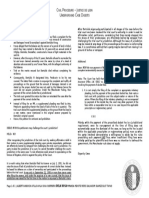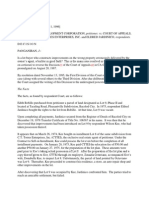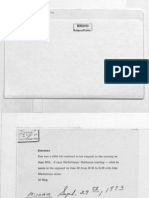0 ratings0% found this document useful (0 votes)
140 viewsCavile vs. Heirs of Cavile PDF
Cavile vs. Heirs of Cavile PDF
Uploaded by
Ige OrtegaThis case involves a dispute over six parcels of land acquired by Bernardo Cavili during his lifetime. Bernardo had three marriages and multiple children. After his death, descendants from his first two marriages filed a complaint for partition against descendants from his third marriage, claiming co-ownership of the properties. However, the third marriage descendants claimed a Deed of Partition had already divided the properties among all heirs. The trial court dismissed the case based on this, but the appellate court reversed, finding issues with the Deed's authenticity. The Supreme Court then ruled that the Deed of Partition was valid, as it was a notarized public document, and its presumption of regularity and authenticity was not overcome by claims about
Copyright:
© All Rights Reserved
Available Formats
Download as PDF, TXT or read online from Scribd
Cavile vs. Heirs of Cavile PDF
Cavile vs. Heirs of Cavile PDF
Uploaded by
Ige Ortega0 ratings0% found this document useful (0 votes)
140 views2 pagesThis case involves a dispute over six parcels of land acquired by Bernardo Cavili during his lifetime. Bernardo had three marriages and multiple children. After his death, descendants from his first two marriages filed a complaint for partition against descendants from his third marriage, claiming co-ownership of the properties. However, the third marriage descendants claimed a Deed of Partition had already divided the properties among all heirs. The trial court dismissed the case based on this, but the appellate court reversed, finding issues with the Deed's authenticity. The Supreme Court then ruled that the Deed of Partition was valid, as it was a notarized public document, and its presumption of regularity and authenticity was not overcome by claims about
Original Title
Cavile vs. Heirs of Cavile.docx.pdf
Copyright
© © All Rights Reserved
Available Formats
PDF, TXT or read online from Scribd
Share this document
Did you find this document useful?
Is this content inappropriate?
This case involves a dispute over six parcels of land acquired by Bernardo Cavili during his lifetime. Bernardo had three marriages and multiple children. After his death, descendants from his first two marriages filed a complaint for partition against descendants from his third marriage, claiming co-ownership of the properties. However, the third marriage descendants claimed a Deed of Partition had already divided the properties among all heirs. The trial court dismissed the case based on this, but the appellate court reversed, finding issues with the Deed's authenticity. The Supreme Court then ruled that the Deed of Partition was valid, as it was a notarized public document, and its presumption of regularity and authenticity was not overcome by claims about
Copyright:
© All Rights Reserved
Available Formats
Download as PDF, TXT or read online from Scribd
Download as pdf or txt
0 ratings0% found this document useful (0 votes)
140 views2 pagesCavile vs. Heirs of Cavile PDF
Cavile vs. Heirs of Cavile PDF
Uploaded by
Ige OrtegaThis case involves a dispute over six parcels of land acquired by Bernardo Cavili during his lifetime. Bernardo had three marriages and multiple children. After his death, descendants from his first two marriages filed a complaint for partition against descendants from his third marriage, claiming co-ownership of the properties. However, the third marriage descendants claimed a Deed of Partition had already divided the properties among all heirs. The trial court dismissed the case based on this, but the appellate court reversed, finding issues with the Deed's authenticity. The Supreme Court then ruled that the Deed of Partition was valid, as it was a notarized public document, and its presumption of regularity and authenticity was not overcome by claims about
Copyright:
© All Rights Reserved
Available Formats
Download as PDF, TXT or read online from Scribd
Download as pdf or txt
You are on page 1of 2
Cavile vs.
Heirs of Cavile ▪ Some of them were residing elsewhere at the time
the deed was partitioned.
Doctrine ● Among the grounds invoked by the FIRST and SECOND heirs
● Rule that all must sign the certificate of non-forum shopping is against the appeal to the Supreme Court made by the THIRD is that
substantially complied with when one among relatives and it violates the rule on the certification against forum shopping
co-owners of the property, sharing a common interest thereon, signs. required to be attached to petitions for review filed with this Court.
This is because they share a common interest thereon, and because o Only one of the twenty-two (22) petitioners, Thomas George
they have a common defense in the complaint as well. Cavili, Sr., executed and signed the certification against
Facts forum shopping when the Rules require that said certification
● Bernardo Cavili contracted three marriages. must be signed by all the petitioners
o 1st – Ines Dumat-ol with whom he had one child – Simplicia
o 2nd – Orfia Colhalho – two kids Fortunato and Vevencia Supreme Court
o 3rd – Tranquilina Galon – three kids Castor, Susana, and ● The certificate of non-forum shopping must be signed by all the
Benedicta petitioners or plaintiffs in a case and the signing by only one of them
● Bernardo acquired six parcels of land during his lifetimes, all of which is insufficient. Note however, that the purpose of te certificate is to
are the subjects of this case. He died. promote and facilitate the orderly administration of justice. Hence it
● The descendants from the FIRST and SECOND marriages should not be interpreted with sucb absolute literalness as to subvert
(respondents) filed a complaint for partition against the descendants its own ultimate and legitimate objective.
from the THIRD marriage (petitioners) o Thus the rule of substantial compliance may be availed of
o FIRST and SECOND alleged that they were the co-owners with respect to the Certificate of Non-Forum Shopping.
of the properties in question, as part of their inheritance from ● The execution by Thomas George Cavile, Sr. in behalf of all the
Bernardo Cavili. other petitioners of the certificate of non-forum shopping constitutes
o They said that when Bernardo died, Castor (child from substantial compliance with the Rules.
THIRD) took over the administration of the properties of the ● All the petitioners, being relatives and co-owners of the
deceased as an administrator of the estate. However, Castor properties in dispute, share a common interest thereon. They
started possessing the properties as an owner, using its also share a common defense in the complaint for partition filed
fruits and refusing the other heirs’ demand for partition. by the respondents. Thus, when they filed the instant petition, they
▪ As of the filing of the case, the THIRD marriage filed it as a collective, raising only one argument to defend their
descendants had already been possessing it for 45 rights over the properties in question. There is sufficient basis,
years. therefore, for Thomas George Cavili, Sr. to speak for and in
● Trial Court ruled in favor of the FIRST and SECOND. It ordered the behalf of his co-petitioners that they have not filed any action or
partition of the six parces of land. However, a new trial was held claim involving the same issues in another court or tribunal, nor
upon motion of Primitivo Cavili and Quirino Cavili (case doesn’t say is there other pending action or claim in another court or
sino sila…) who alleged that they weren’t served summons. tribunal involving the same issues.
● Trial Court dismissed the complaint for partition
o This was based on evidence adduced by Primitivo and Other discussion
Quirino that a Deed of Partition was already executed before After a thorough study of the records of this case, we find the petition to be
the case, where descendants from all marriages meritorious. We hold that the trial court was correct in dismissing the
participated. complaint for partition, it appearing that the lawful heirs of Bernardo Cavili
● Court of Appeals reversed the trial court decision have already divided the properties among themselves, as evidenced by the
o Due execution and genuineness of the Deed of Partition was Deed of Partition.
never proven. FIRST and SECOND were able to cast doubt
as to its authenticity. The document speaks for itself. The foregoing document was acknowledged
▪ Thumbprints of some were merely inkblots before Notary Public Iluminado Golez and recorded in his notarial book.
Documents acknowledged before notaries public are public documents which
are admissible in evidence without necessity of preliminary proof as to their
authenticity and due execution. They enjoy the presumption of regularity. It is
a prima facie evidence of the facts stated therein.
The presumption of regularity was not overcome in this case
● Re: inkblot – it’s a signature. Note the visible grooves or lines on the
imprint that indicate that they are not mere drops of ink but an actual
thumbprint.
● Re: residing elsewhere – does not preclude the possibility that
Simplicia Cavile could have traveled from her residence in Mindanao
to Tolong, Negros Oriental to participate in the execution of the Deed
of Partition
You might also like
- Final Dissertation LLM FinalDocument177 pagesFinal Dissertation LLM FinalShubham Jain Modi64% (25)
- Case 2: Vs - Sandiganbayan (Fourth Division), Jose LDocument3 pagesCase 2: Vs - Sandiganbayan (Fourth Division), Jose Lidmu bcpo100% (1)
- Case Digests Property IDocument3 pagesCase Digests Property ITugs Victor de GuzmanNo ratings yet
- Succession Digest 9-25-17Document23 pagesSuccession Digest 9-25-17Dustin NitroNo ratings yet
- Case AnalysisDocument5 pagesCase AnalysisrhobiecorboNo ratings yet
- 2 Barut v. CabacunganDocument9 pages2 Barut v. CabacunganReyar SenoNo ratings yet
- Gordulan Vs GordulanDocument1 pageGordulan Vs Gordulananne labuyoNo ratings yet
- Landcenter v. Ponce (Rule 17)Document1 pageLandcenter v. Ponce (Rule 17)Lynne SanchezNo ratings yet
- G.R. No. 187944Document1 pageG.R. No. 187944KidMonkey2299No ratings yet
- Andrada Vs PhilhinoDocument12 pagesAndrada Vs PhilhinoRam Rael VillarNo ratings yet
- PTA vs. Sabandal-HersentielDocument7 pagesPTA vs. Sabandal-HersentielPearl Regalado MansayonNo ratings yet
- 8 PNB Vs CaDocument16 pages8 PNB Vs CaptdwnhroNo ratings yet
- Anita Reyes-Mesugas vs. Alejandro Aquino ReyesDocument3 pagesAnita Reyes-Mesugas vs. Alejandro Aquino ReyesjoantogoresNo ratings yet
- Hinog V MelicorDocument1 pageHinog V MelicorwifiNo ratings yet
- Sales JurisprudenceDocument23 pagesSales Jurisprudencepoiuytrewq9115No ratings yet
- Alaban vs. Court of Appeals 470 SCRA 697 G.R. No. 156021 September 23 2005Document5 pagesAlaban vs. Court of Appeals 470 SCRA 697 G.R. No. 156021 September 23 2005Ismael Catalino Maestre100% (1)
- Salas V CA, GR No. 76788 Jan 22, 1990Document3 pagesSalas V CA, GR No. 76788 Jan 22, 1990Marianne Shen PetillaNo ratings yet
- Comparative Analysis: Gan vs. Yap (August 30, 1958) Vis-À-Vis Rodelas vs. Aranza (December 7, 1982)Document2 pagesComparative Analysis: Gan vs. Yap (August 30, 1958) Vis-À-Vis Rodelas vs. Aranza (December 7, 1982)Paulo Abenio EscoberNo ratings yet
- Heirs of Dinglasan Vs Ayala Corporation G.R. No. 204378, August 05, 2019 Case DigestDocument3 pagesHeirs of Dinglasan Vs Ayala Corporation G.R. No. 204378, August 05, 2019 Case Digestbeingme2No ratings yet
- Pasagui v. VillablancaDocument8 pagesPasagui v. VillablancaArnold BagalanteNo ratings yet
- Victoria Et. Al vs. Pidlaon Et. Al., G.R. NO. 196470, APRIL 20, 106Document7 pagesVictoria Et. Al vs. Pidlaon Et. Al., G.R. NO. 196470, APRIL 20, 106Gendale Am-isNo ratings yet
- Arguelles v. Malarayat Rural Bank, GR No. 200468, March 19, 2014 Case DigestDocument3 pagesArguelles v. Malarayat Rural Bank, GR No. 200468, March 19, 2014 Case Digestbeingme2100% (1)
- 3 Parel V PrudencioDocument18 pages3 Parel V PrudencioCharles RiveraNo ratings yet
- Sabidong CaseDocument15 pagesSabidong Casejodelle11No ratings yet
- Heirs of Maximo Sanjorjo VDocument2 pagesHeirs of Maximo Sanjorjo VohmygodsunNo ratings yet
- Board of Liquidators Vs ZuluetaDocument9 pagesBoard of Liquidators Vs ZuluetaLouNo ratings yet
- Home Bankers Savings vs. CA, Et. Al. DigestDocument4 pagesHome Bankers Savings vs. CA, Et. Al. DigestXyrus BucaoNo ratings yet
- Notes On Intellectual Property (Ip) Law: Mylene I. Amerol - MacumbalDocument41 pagesNotes On Intellectual Property (Ip) Law: Mylene I. Amerol - MacumbalAlain BarbaNo ratings yet
- Envi Law CasesDocument8 pagesEnvi Law CasesLeiBautistaNo ratings yet
- G.R. No. 160239Document13 pagesG.R. No. 160239alain_kris0% (1)
- Duldulao V CADocument2 pagesDuldulao V CAdiyesaNo ratings yet
- Ligon Vs RTC Case DigestDocument1 pageLigon Vs RTC Case DigestMTCDNo ratings yet
- Pleasantville Dev. Corp. vs. CA, Et Al, G.R. No. 79688, February 1, 1996 ORIGINALDocument10 pagesPleasantville Dev. Corp. vs. CA, Et Al, G.R. No. 79688, February 1, 1996 ORIGINALJacquelyn AlegriaNo ratings yet
- Adelaida Infante v. Aran Builders, Inc., G.R. No. 156596, August 24, 2007Document2 pagesAdelaida Infante v. Aran Builders, Inc., G.R. No. 156596, August 24, 2007Emmanuel SilangNo ratings yet
- Heirs of Rosendo Sevilla Florencio VsDocument1 pageHeirs of Rosendo Sevilla Florencio VsDon BallesterosNo ratings yet
- Lukban V Optimum Development Bank (Mortgage-Rghts and Obligation)Document2 pagesLukban V Optimum Development Bank (Mortgage-Rghts and Obligation)Robert RosalesNo ratings yet
- Banking Law Case DigestDocument4 pagesBanking Law Case DigestStella PolicarpioNo ratings yet
- ADR Compiled Cases PDFDocument40 pagesADR Compiled Cases PDFEphraimEnriquezNo ratings yet
- Patrimonio VS GutierezDocument4 pagesPatrimonio VS GutierezRyan SuaverdezNo ratings yet
- Syquia V Ca Digested DDDDDocument1 pageSyquia V Ca Digested DDDDVincent BernardoNo ratings yet
- Title: Asian Construction and Development Corporation, vs. Sannaedle Co., Ltd. Source: G.R. No. 181676, June 11, 2014 Ponente: Peralta, JDocument4 pagesTitle: Asian Construction and Development Corporation, vs. Sannaedle Co., Ltd. Source: G.R. No. 181676, June 11, 2014 Ponente: Peralta, Jidmu bcpoNo ratings yet
- Lorbes Vs CADocument2 pagesLorbes Vs CAMoon BeamsNo ratings yet
- Cristobal vs. CA PDFDocument12 pagesCristobal vs. CA PDFcarlo_tabangcuraNo ratings yet
- Allandale Sportsline v. Good Development Corp, G.R. No. 164521, December 18, 2008Document15 pagesAllandale Sportsline v. Good Development Corp, G.R. No. 164521, December 18, 2008Alan Vincent FontanosaNo ratings yet
- Gayoso Vs Twenty TwoDocument8 pagesGayoso Vs Twenty TwoEnnavy YongkolNo ratings yet
- Nera v. RimandoDocument3 pagesNera v. RimandotheagNo ratings yet
- Leung Yee vs. Strong Machinery 37 Phil 644Document9 pagesLeung Yee vs. Strong Machinery 37 Phil 644Jayzell Mae FloresNo ratings yet
- DigestDocument2 pagesDigestNivra Lyn EmpialesNo ratings yet
- Sales Digest OdtDocument10 pagesSales Digest OdtJamie VodNo ratings yet
- LDP Marketing, Inc. vs. MonterDocument2 pagesLDP Marketing, Inc. vs. MonterMarkyNo ratings yet
- Antonietta Garcia Vda. de Chua vs. Court of Appeals - Philippine Jurisprudence Case DigestDocument2 pagesAntonietta Garcia Vda. de Chua vs. Court of Appeals - Philippine Jurisprudence Case DigestwupwupwupNo ratings yet
- Rule 86 - Specpro - Claims Against Estate (Pasia, Pamela)Document43 pagesRule 86 - Specpro - Claims Against Estate (Pasia, Pamela)PammyNo ratings yet
- Rules On Succession Digests 1Document8 pagesRules On Succession Digests 1Adam Oliver DensenNo ratings yet
- SCA TSN Rules 62-66Document16 pagesSCA TSN Rules 62-66luidkinniNo ratings yet
- Nufable v. NufableDocument7 pagesNufable v. NufablePinky De Castro AbarquezNo ratings yet
- Case 1Document8 pagesCase 1mario navalezNo ratings yet
- 6 Fernando Juan Vs Roberto JuanDocument8 pages6 Fernando Juan Vs Roberto Juancertiorari19No ratings yet
- Saligumba Vs PalanogDocument2 pagesSaligumba Vs PalanogRea RomeroNo ratings yet
- Balanay, Jr. vs. Martinez, 64 SCRA 452, No.L-39247 June 27, 1975Document5 pagesBalanay, Jr. vs. Martinez, 64 SCRA 452, No.L-39247 June 27, 1975Ismael Catalino MaestreNo ratings yet
- Digest - Cavile v. Heirs of Clarita CavileDocument2 pagesDigest - Cavile v. Heirs of Clarita CavileAleli Guinto100% (1)
- 068 - Cavile v. CavileDocument2 pages068 - Cavile v. CavileIhna Alyssa Marie SantosNo ratings yet
- Vengco v. TrajanoDocument2 pagesVengco v. TrajanoIge OrtegaNo ratings yet
- Policy Instructions No. 20-76: Stabilizing Employer-Employee Relations in The Construction IndustryDocument3 pagesPolicy Instructions No. 20-76: Stabilizing Employer-Employee Relations in The Construction IndustryIge Ortega100% (1)
- Therkelsen v. RepublicDocument1 pageTherkelsen v. RepublicIge OrtegaNo ratings yet
- Best Wear Garments v. OcubilloDocument3 pagesBest Wear Garments v. OcubilloIge OrtegaNo ratings yet
- Fisheries CodeDocument56 pagesFisheries CodeIge OrtegaNo ratings yet
- Kho V CADocument5 pagesKho V CAIge OrtegaNo ratings yet
- United Polyresins v. PinuelaDocument3 pagesUnited Polyresins v. PinuelaIge OrtegaNo ratings yet
- Case Name Go v. Looyuko Topic Case No. - Date GR No. 147923 - October 26, 2007 Ponente Relevant FactsDocument2 pagesCase Name Go v. Looyuko Topic Case No. - Date GR No. 147923 - October 26, 2007 Ponente Relevant FactsIge OrtegaNo ratings yet
- Appellee's Brief RequirementsDocument2 pagesAppellee's Brief RequirementsIge OrtegaNo ratings yet
- People v. Jeric FernandezDocument3 pagesPeople v. Jeric FernandezIge OrtegaNo ratings yet
- Baguio Country Club CorporationDocument2 pagesBaguio Country Club CorporationIge OrtegaNo ratings yet
- Homar vs. PeopleDocument1 pageHomar vs. PeopleIge OrtegaNo ratings yet
- Ganzon Vs KayananDocument2 pagesGanzon Vs KayananIge OrtegaNo ratings yet
- People vs. EstellaDocument2 pagesPeople vs. EstellaIge Ortega100% (1)
- San Diego Vs Naujan ONLYDocument2 pagesSan Diego Vs Naujan ONLYIge Ortega100% (1)
- Local Chief ExecutivesDocument10 pagesLocal Chief ExecutivesIge OrtegaNo ratings yet
- ESTANISLAO CaseDocument21 pagesESTANISLAO CaseIge OrtegaNo ratings yet
- Hebron Vs ReyesDocument2 pagesHebron Vs ReyesIge Ortega100% (1)
- Module 6 - Virginity and RapeDocument17 pagesModule 6 - Virginity and RapeIge OrtegaNo ratings yet
- Claro M. Recto, Francisco R. Capistrano, Pelaez, Pelaez and Pelaez and Ernesto V. Chavez For Appellants. Pineda, Hermosisima and Neri For AppelleesDocument5 pagesClaro M. Recto, Francisco R. Capistrano, Pelaez, Pelaez and Pelaez and Ernesto V. Chavez For Appellants. Pineda, Hermosisima and Neri For AppelleesIge OrtegaNo ratings yet
- INTENTION (Animus Revertendi) Rather Than Anything Else Residence Largely Depends Upon Intention Inferred From Acts and Utterances. TheDocument25 pagesINTENTION (Animus Revertendi) Rather Than Anything Else Residence Largely Depends Upon Intention Inferred From Acts and Utterances. TheIge OrtegaNo ratings yet
- Brock Turner Appeal - Initial BriefDocument172 pagesBrock Turner Appeal - Initial BriefABC10No ratings yet
- Civil Law Repoto DraftDocument14 pagesCivil Law Repoto DraftBianca Viel Tombo CaligaganNo ratings yet
- 国歌Document7 pages国歌gchenihoNo ratings yet
- Rodriguez vs. CA, 27 SCRA 546Document11 pagesRodriguez vs. CA, 27 SCRA 546AngelReaNo ratings yet
- Fabian v. DesiertoDocument2 pagesFabian v. DesiertoKathleen del RosarioNo ratings yet
- Rahul Kumar Shribathry - Hadley v. BaxendaleDocument6 pagesRahul Kumar Shribathry - Hadley v. BaxendaleRahul K ShribathryNo ratings yet
- Folder 9/10: 18 1/2 Minute Gap NotesDocument106 pagesFolder 9/10: 18 1/2 Minute Gap NotesPrologue MagazineNo ratings yet
- Tinker v. Des Moines Independent Community School Dist., 393 U.S. 503 (1969)Document18 pagesTinker v. Des Moines Independent Community School Dist., 393 U.S. 503 (1969)Scribd Government DocsNo ratings yet
- Page 64 Sps. Javellana Vs Benito Legarda 59Document3 pagesPage 64 Sps. Javellana Vs Benito Legarda 59Nafiesa ImlaniNo ratings yet
- Ricafort VS MedinaDocument2 pagesRicafort VS MedinaKristeta Pedalezo100% (3)
- United States v. Michael Curtiss, 330 F.2d 278, 2d Cir. (1964)Document15 pagesUnited States v. Michael Curtiss, 330 F.2d 278, 2d Cir. (1964)Scribd Government DocsNo ratings yet
- (GR) JM Tuason V Vda de Lumanlan (1968)Document5 pages(GR) JM Tuason V Vda de Lumanlan (1968)Jethro KoonNo ratings yet
- Polity Questions in UPSC Prelims (2022 - 2013)Document26 pagesPolity Questions in UPSC Prelims (2022 - 2013)annu14307No ratings yet
- Antonio Vs Reyes Case Digest de LeonDocument1 pageAntonio Vs Reyes Case Digest de Leongherold benitezNo ratings yet
- United States v. Benjamin Indiviglio, 352 F.2d 276, 2d Cir. (1965)Document7 pagesUnited States v. Benjamin Indiviglio, 352 F.2d 276, 2d Cir. (1965)Scribd Government DocsNo ratings yet
- United States v. Timothy Brick, 900 F.2d 256, 4th Cir. (1990)Document3 pagesUnited States v. Timothy Brick, 900 F.2d 256, 4th Cir. (1990)Scribd Government DocsNo ratings yet
- United States v. Joseph Montanaro, 362 F.2d 527, 2d Cir. (1966)Document2 pagesUnited States v. Joseph Montanaro, 362 F.2d 527, 2d Cir. (1966)Scribd Government DocsNo ratings yet
- G.R. No. 202867 People vs. LabiagaDocument6 pagesG.R. No. 202867 People vs. LabiagaMichelle Montenegro - AraujoNo ratings yet
- 7 Camid vs. Office of The President Gr. No.161414 January 17, 2005Document2 pages7 Camid vs. Office of The President Gr. No.161414 January 17, 2005theresagriggs86% (7)
- Carino vs. CHRDocument3 pagesCarino vs. CHRKristine JoyNo ratings yet
- LLB-III-5th Sem - 2013-14 - PDFDocument58 pagesLLB-III-5th Sem - 2013-14 - PDFMayuresh DalviNo ratings yet
- Cases in Succession Set 1Document34 pagesCases in Succession Set 1santasantitaNo ratings yet
- An Analysis of Pure Economic LossDocument14 pagesAn Analysis of Pure Economic LossWilliam TongNo ratings yet
- Aseanlic 19593 02 78 10 2014Document117 pagesAseanlic 19593 02 78 10 2014jasfsldkNo ratings yet
- Libertarian Party of Ohio v. CritesDocument18 pagesLibertarian Party of Ohio v. CritesCato InstituteNo ratings yet
- KAS Kadana Test 02Document48 pagesKAS Kadana Test 02malgeram13No ratings yet
- Ra 10372Document9 pagesRa 10372donniefrancoNo ratings yet
- Chapter 5 Motivation Goal Setting TheoryDocument4 pagesChapter 5 Motivation Goal Setting Theoryzahoor ahmadNo ratings yet
- Horizon Trial: Application To Recuse Presiding JudgeDocument3 pagesHorizon Trial: Application To Recuse Presiding JudgeNick Wallis100% (1)














































































































